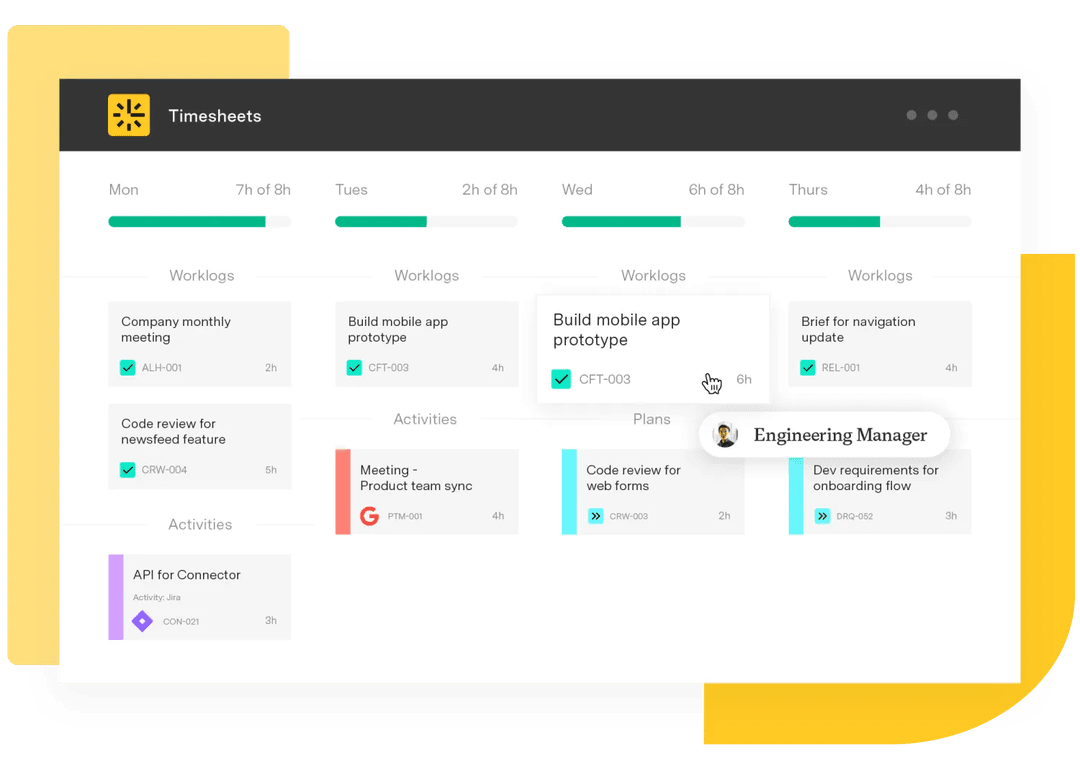Subject matter expert: Role and responsibilities
Tempo Team
Organizations work more efficiently when they can tap into the right expertise at the right time. A subject matter expert (SME) brings focused knowledge in a specific domain to help teams avoid costly missteps and make informed decisions.
Whether they’re reviewing compliance documentation, guiding software development, or advising on financial processes, SMEs make sure the work is correct and the plan stays pointed in the right direction.
In this guide, we’ll explain what a subject matter expert is, outline their core responsibilities, and share tips for becoming one. We’ll also highlight how Tempo’s tools help SMEs contribute effectively across teams and projects.
What’s a subject matter expert (SME)?
A subject matter expert (SME), or domain expert, is a professional with specialized expertise in a particular field, process, or technology. Unlike generalists who work across many areas, SMEs focus on one discipline, drawing on years of experience, advanced training, and niche skills.
Organizations often bring SMEs into projects to explain complex topics in plain terms and to validate that details are accurate. They also ensure technical solutions align with business needs, minimizing risk and guiding teams toward better outcomes – especially in regulated industries or high-stakes software development initiatives.
In project management, SMEs connect strategic goals and execution. They usually collaborate with stakeholders and answer technical questions, and many also review deliverables to confirm they meet company or client expectations. Their depth of knowledge gives teams a reliable source of guidance from planning through delivery.
Responsibilities of subject matter experts
The role of a subject matter expert often shifts as work progresses, from shaping early decisions to reviewing final deliverables. But SMEs bring insight and precision to every stage. Their impact shows up in many ways – below are some of the most common.
Providing expert insight
SMEs offer a perspective shaped by real-world problem-solving. They might step in to simplify a process that’s blocking progress or raise a concern that shifts the team’s approach.
Reviewing deliverables
Subject matter experts examine the work closely to confirm it’s accurate and compliant with required standards. A single early comment from an SME can prevent a major rewrite later.
Supporting development and testing
In software development and other build phases, SMEs spell out functional and technical requirements, then help define when the work is truly done. They might join a prototype review or step in when test results don’t match expectations.
Facilitating cross-functional collaboration
SMEs act as connectors between stakeholders in different departments – and even different personality types. They turn specialized knowledge into clear direction so the right people can act at the right time.
Guiding training and onboarding
SMEs often make an effort to pass on what they know, whether through workshops or written guides. Their involvement shortens the learning curve and keeps valuable institutional knowledge from fading.
Staying current
To maintain credibility, SMEs watch for changes in their field and adapt quickly. That might mean pursuing certification or simply joining the conversations where new ideas take shape.
How to become a subject matter expert: 6 steps
Becoming a subject matter expert takes years of focused learning and hands-on work. There’s no single certificate that makes someone an SME, but there are many ways to build – and prove – the domain knowledge that earns the title.
1. Build hands-on experience
Most SMEs start by immersing themselves in a particular field through everyday work. You might be designing network infrastructure, running supply chain operations, or handling compliance in a tightly regulated industry. Day after day, you see how theory meets reality and solve problems with no manual covers. That eventually teaches you how to pick up patterns that aren’t obvious to newcomers. Over time, others begin to look to you as a leader they can rely on for insights, and you become a person they trust in that domain.
2. Get advanced training or certification
Structured learning adds weight to your experience. Depending on your field, this might mean earning a technical certification like CISSP for cybersecurity, completing a PMP for project management, or pursuing postgraduate study. These credentials send a clear signal: Your expertise has been tested, and you’ve invested in sharpening it.
3. Share knowledge publicly
Proving your domain expertise often means stepping beyond your immediate team. You might write an article for an industry site, speak at a conference, or publish internal guides others can follow. Teaching a subject forces you to know it inside and out and shows others you’re equipped to lead.
4. Stay updated on industry trends
If you don’t maintain your expertise, it’s bound to fade. SMEs keep their edge by watching what’s changing in tools, standards, and regulations. You could be scanning trade publications one week and taking part in a professional forum the next. Staying alert means your guidance stays relevant.
5. Develop communication skills
Knowledge alone isn’t enough – you have to make it usable. SMEs often explain technical points to stakeholders who don’t share their background. That might mean replacing corporate jargon with examples that fit the audience or reframing an idea so others get it instantly.
6. Demonstrate consistency and reliability
SMEs earn trust not just by knowing the right answer but by showing they can be counted on. Being able to respond quickly and in detail and solve problems under pressure builds a reputation that lasts. When people know you’ll deliver accurate, actionable insight every time, you become an indispensable member of the team.
Example SME scenarios
Subject matter experts exist in nearly every industry. Their fields may vary, like those below, but their role is the same – to provide expert insight that shapes decisions and ensures accuracy to improve outcomes.
IT SME: Infrastructure support during cloud migration
During a company-wide shift to cloud computing, IT SMEs might map out infrastructure requirements and flag compatibility issues before they become costly. They work closely with security teams to protect data and help businesses make tech choices that fit their long-term needs.
Finance SME: Compliance with changing regulations
When tax laws or reporting requirements shift, finance SMEs know how to interpret the changes and guide the organization in updated processes. Their expertise ensures financial practices are compliant and reduces the risk of errors or penalties during audits.
Product SME: Technical accuracy in go-to-market content
Before a new product launch, product SMEs might review customer-facing materials, such as datasheets, user guides, and sales presentations, to ensure that technical claims are accurate and clearly explained. Their input supports credibility and prevents misinformation while giving marketing and sales teams the confidence to speak with authority.
Project management SME: Delivering specialized implementations
Project manager SMEs with experience in a specific industry, like healthcare billing or construction, can lead initiatives that might challenge generalist PMs. Their familiarity with niche tools and workflows helps keep delivery on schedule and aligned with the required specifications.
Supporting SME collaboration with Tempo
SMEs have the most impact when their insight is easy to access and built into team workflows. Tempo’s Jira-native tools make that possible by streamlining time tracking, project estimation, and documentation.
Timesheets log the hours SMEs spend on research, reviews, and meetings, giving teams a clear view of workload and where extra support may be needed. Structure PPM maps SME contributions against milestones and strategic goals, making their input visible and actionable throughout the project lifecycle.
Keep projects accurate, informed, and on track – with Tempo.












































